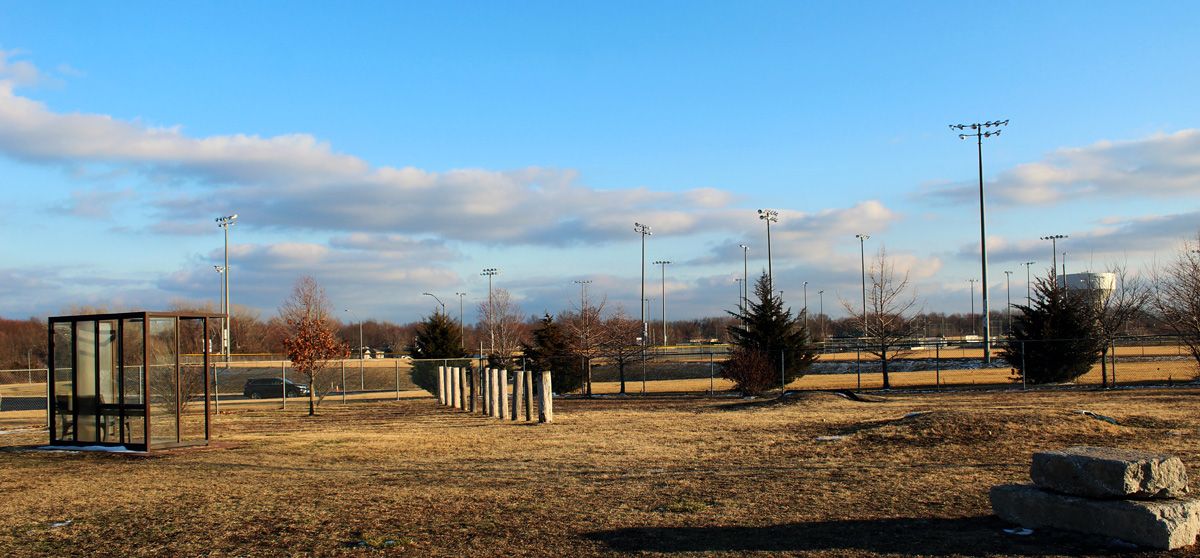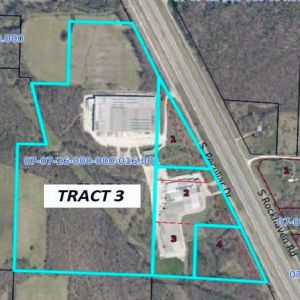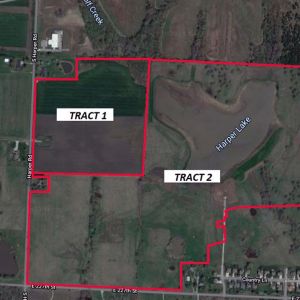
Question 4 on the Belton ballot asks residents to approve a local use tax to fund various projects, including improving the dog park located in Markey Park. (Tyson Fisher / Raymore Journal).
April 5 ballot questions in Cass County, explained
By Tyson Fisher
Voting for the General Municipal Election is just around the corner on April 5. Although there are no ballot questions specific to Raymore, there are several issues to be decided in other parts of North Cass County.
Public Water Supply District No. 2
“Shall the Public Water Supply District No. 2 of Cass County, Missouri, issue its waterworks revenue bonds in an aggregate amount not to exceed $8,000,000 to acquire, construct, improve and upgrade the water system to serve the district, including without limitation, to replace obsolete glued joint piping, to increase water capacity throughout the water system, to maintain compliance with drinking water regulations, and to be eligible to obtain grants and low-cost loans?”
A rare move from Cass County PWSD No. 2, the district is asking for approval of an $8 million bond. Established in 1967, PWSD No. 2 has passed a bond only once in 1985 for $4 million.
According to the water supply district, the original distribution system used a Class 160 pressure class pipe with glued joints to reduce costs. At the time, there were only 300 customers.
More than 50 years later, the original glue joint pipe has reached its useful life, resulting in an increase in water losses. About 17 miles of original pipe needs to be replaced. The water district has already replaced about 10 miles of pipe since 2012. Replacement of the remaining glue joint is essential to maintain water quality, pressure and to control lost water, according to the water district.
Cass County PWSD No. 2 states that bond capacity is necessary to take advantage of all federal or state funding for improvement projects. Pipe replacement is estimated to cost $9.5 million. Total bond capacity should cover required improvements for at least 10 years.
For more information, the water district will hold a public meeting at 6:30 p.m. on Thursday, March 24, at the water district office located at 807 E. 187th St. in Belton.
Central Cass County Fire Protection District
“Shall the board of directors of the Central Cass County Fire Protection District be authorized to levy an additional tax of not more than thirty cents ($0.30) on the one hundred dollars ($100.00) assessed valuation to provide funds for the support of an ambulance service or partial or complete support of an emergency medical technician defibrillator program or partial or complete support of an emergency medical technician paramedic first responder program?”
If passed, the tax will bring the fire district’s Emergency Medical Services (EMS) levy up to and equal with its fire levy.
According to the district, EMS has become 85% of what it does as an organization. Due to the low EMS levy, the fire district is unable to staff ambulances appropriately.
Paramedics at Central Cass County Fire Protection District get paid $15.00 an hour. However, the average wage for a paramedic in Missouri is $22.50 an hour. The fire district states it needs to increase the levy to pay employees a living wage.
The fire district also told The Raymore Journal it also has an issue in that it currently staffs two people on an engine. Consequently, the fire district does not meet National Fire Protection Association requirements for the “two-in/two-out” procedure.
According to the U.S. Occupational Safety and Health Administration, the procedure requires that at least two employees enter the Immediately Dangerous to Life or Health (IDLH) atmosphere and always remain in visual or voice contact with each other. It also requires that at least two employees be located outside the IDLH atmosphere, thus the term, “two in/two out.”
The Central Cass County Fire Protection District plans on adding at least one firefighter/EMT per shift to meet the requirement. The cost of running EMS has nearly tripled in the last couple of years, including costs of purchasing supplies and pharmaceuticals
The fire district puts it in simple terms: “We either step up our pay and benefits, or we close our doors.”
Belton Question 1
“Shall the City of Belton, Missouri, issue its general obligation bonds in the amount of $21,000,000 to construct, reconstruct, extend and improve the streets and roads of the City, and to acquire any easements and rights-of-way?”
According to Belton’s website, funds from this “Street GO Bonds” will go toward 20 more miles of streets reconstructed; 90,000 more feet of curb replaced; and 115 more sidewalk ramps that are Americans with Disabilities Act (ADA) compliant.
In 2019, Belton voters approved of a similar GO bond. Those funds rebuilt 17.5 miles of residential roads, replaced 48,000 feet of curb, and added 113 ADA-compliant sidewalk ramps.
The 2022 GO bond is picking up where the 2019 bond left off and will not increase taxes.
According to the city, more than 41% of streets in Belton were constructed in the 1950s or earlier. More than 88% were built before 2000.
Belton Question 2
“Shall the City of Belton, Missouri, issue its waterworks revenue bonds in an amount not to exceed $60,000,000 to acquire, construct and improve the City’s waterworks system, including but not limited to, the replacement of water infrastructure and to build an additional water tower, with the principal of and interest on said revenue bonds to be payable from the revenues derived by the City from the operation of its waterworks system, including all future extensions and improvements thereto?”
Question 2 is asking residents to approve of water revenue bonds for water line replacement. Funds will go toward replacing failing water line infrastructure over the next five years.
Approval of the bonds will not result in an increase in the water debt rate.
Belton has more than 22 miles of cast iron water lines that are 80 to 60 years old. The average lifespan of a cast iron pipe is 50 to 75 years.
Additionally, Belton has more than 3 miles of asbestos cement water lines that are about 70 years old. The average lifespan of asbestos cement is approximately 70 years.
Furthermore, Belton has more than 28 miles of ductile iron water lines which have an average lifespan of 50 to 100 years based on soil conditions. Belton’s soil is corrosive and has caused problems with many of the city’s ductile water lines which were installed decades ago.
If the problem is not addressed, Belton businesses and homes may lose water service. There is also a possibility of damage to roads, driveways, and sidewalks. Contaminated water lines are another possible consequence.
How will the city pay for these bonds? Residents will have to vote for Question 3.
Belton Question 3
“Shall the City of Belton, Missouri, be authorized to eliminate the termination provision of the capital improvement sales tax and continue to impose its capital improvement sales tax of one half of one percent for the purpose of funding the costs of capital improvements for the City, including the payment of debt service on financings incurred to construct capital improvements for the City?”
As the City of Belton points out, Questions 2 and 3 “work together to address water line issues.” In this case, Question 3 will extend an existing half-cent capital improvement sales tax that voters approved of in 2007.
So far, that sales tax is paying for the debt incurred for the remodel and updates to the police station and City Hall Annex, the construction of the 71 highway and Y interchange, a DNR energy loan, and Fire and Emergency Management purchases including a fire truck, vehicles and equipment.
If Question 2 fails and Question 3 passes, the sales tax will be used to replace failing water lines on a pay-as-you-go plan over the next several decades.
Belton Question 4
“Shall the City of Belton, Missouri, impose a local City use tax at the same rate as the total local City sales tax rate (currently three and one-quarter percent (3.25%)) provided that if the local sales tax rate is reduced or raised by voter approval, the local use tax rate shall be reduced or raised by the same action?”
If approved, the use tax will pay for the widening of Interstate 49 to six lanes from 155th Street to North Cass Parkway as part of a regional partnership with Cass County, Raymore and Grandview.
That is just the big-ticket item. Funds will also go toward trail improvement, sidewalk grant program, dog park improvements, splash pad/park improvements, and ongoing street/stormwater projects.
In January, Mayor Norman Larkey Sr. signed a resolution that created a Use Tax Oversight Committee. Comprised of five citizens, the committee will make sure that funds from the use tax will be spent as intended. Committee members must include one citizen from each of the four wards and one citizen at-large. No committee member can be a city official or employee.
According to the city, a use tax is collected instead of sales tax when a resident purchases retail goods from an out-of-state vendor in a taxable transaction not subject to sales taxes. Although the state and county collect use taxes, the City of Belton currently does not.
If Question 4 is approved, purchases from out-of-state businesses delivered to a Belton address will be taxed the same as an item purchased in a Belton store. A use tax and sales tax are never collected on the same transaction. A purchase will never be taxed twice.
Lake Winnebago
“Shall the City of Lake Winnebago impose a local use tax at the same rate as the total local sales tax rate, provided that if the local sales tax rate is reduced or raised by voter approval, the local use tax rate shall also be reduced or raised by the same action?”
Like Belton’s Question 4, Lake Winnebago is asking residents to approve of a local use tax as well. The city defines a use tax as a tax that is paid when purchases are made other than at retail. Examples would include purchases from out-of-state businesses, including catalog, online and direct market sales. A resident pays a use tax instead of a local sales tax. Again, never both. One or the other.
Unlike Belton’s Question 4, revenue from a local use tax will not be allocated to specific projects. Many municipalities install a use tax to keep local businesses competitive in an increasingly digital world. Additionally, municipalities are receiving less sales tax revenue due to online shopping siphoning that funding source.
Peculiar
“Shall the city limits of the City of Peculiar, Missouri, be extended so as to embrace and include all the unincorporated area lying within the following boundary lines and found in the County of Cass?”
Pretty straight forward. See the above map for the three tracts the city seeks to annex.

